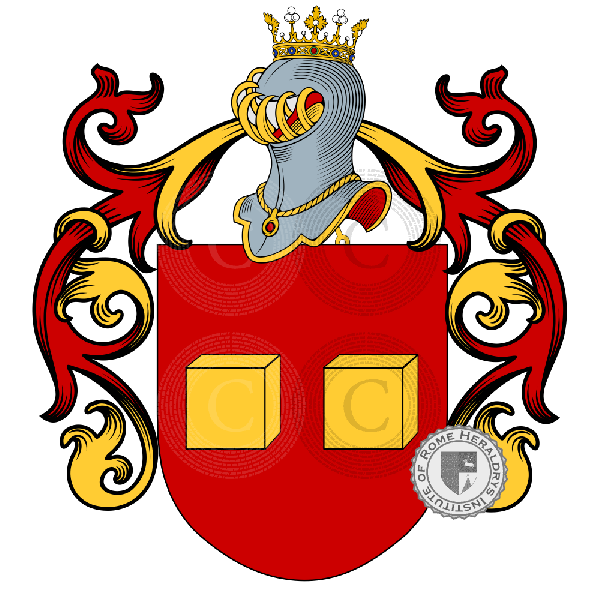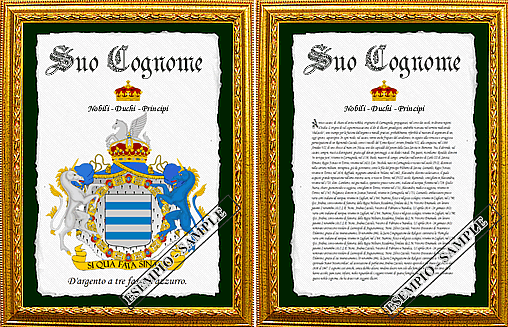

You may be interested
Both buckets and Sechi seem to have more strains, in Lombardy and Emilia, in Genoa and is widespread throughout Sardinia, dry is decidedly Veneto, very widespread in Vicenza, Trevisano and Venetian, with strains also in Veronese, Bellunese, Padua and Rovigoto, That is almost unique, it would seem Sardinian, Sequi would seem of Florentine origin, with a stump in Florence and Rufina and Pontassieve in the Florentine and a secondary strain in Sardinia in Cagliari and Oristano, could result from nicknames originated from the thinness of Founders. Additions provided by Giacomo Ganza-Villa di Tirano (SO) could derive from the adjective sec (see Bergamasco Dictionary) by Antonio Tiraboschi, this word referred to a person emphasizes its thinness. A Villa (BG) Sec is found as a nickname for two families. Integrations provided by Alberto Sechi both Sechi and Secchi have the same origin. The Sardinian branch can be originated from Liguria. Buckets in Genoa in 1199 are among the signatories of the oath of fidelity of the Marquis Malaspina, then feudatories in Sardinia, where the surname is attested already in the Condaghi (registers of the acts of the convents, Sec. XI-XII) with the various spellings Seke, Secke, Sechie, Sekke, then later in the same, Sechi, buckets and Sequi (with Spanish spelling). Currently spread both variants. Integrations provided by Giuseppe Concas SECCHI; SECHI SECHE SECCI SECI: Surely they have in common (as Sardinian surnames, you mean!) the meaning and the etymology, which however remain unknown to us, at least for now! The fact is that we find them in the ancient documents of the Sardinian language and history, and also in a fairly widespread way. We can only try hypotheses, which remain so until proven otherwise. In the Sardinian language there are several words that may have given origin to the surname, which we find in medieval documents in all its variants. 1 ° > There is in Sardinian the verb secare (central), sawing (log.), Segai (camp.), meaning to cut, break, break; Secare in Latin. 2nd > The term Seiki (central), Seigi (log.), Sexi (camp.) in the meaning of sixteen; From the Latin sedecim. 3rd > The term sèdo (central which indicates the harvest fodder, the harvest; from the Latin seges. 4th There is finally the term Séneke (central) which means old, and would give in shortened form séke; from the Latin senex. Finally there is the term SICCU = dry, from siccare or Siccai = Seccare, from the Latin siccare. Some suggest also Secchia or bucket, from Italian, but here the bucket is commonly said SA Sìccia or even "Séccia" (Santulussurgiu), which could still be good for Secci and Seci. In this last case also buckets and Sechi could have meaning and etymon in common with those of the peninsula, but in the ancient documents of Sardinia appears especially in the variants of the IC, Seke, Secke, Seque (this last could come from the Latin Sequi = follow). And so on meaning and etymology remain uncertainties. In the ancient documents, in the list of the signatories of the Peace of Eleanor, LPDE of 1388, we find several people with this surname, in its various exits: Secce Georgio, Selluri villas, * * Selluri-Sedduri-Seddori: Today's Sanluri. Et ego Capula Marcus. Sindicus, actor et Procurator Ville Selluri. Seu a Petro De Castay, locunlieutenant capitanei et Margiano Costa, locunlt potestatis terre Selluri et omnibus habitatoribus dicte terre, Congregatis. X die Januarii 1388; Sece Creyndeu, Jurato ville Tuyli, * Tuyli. Today's Tuili. Contrate Marmille; Sece Joanne, Ville Ecclesiarum, * * Villa Ecclesiarum. Today's Iglesias. Et ego De Nelli Pelipaparius Ludovicus, Civis et habitator terre et Ville Ecclesiarum. Sindicus, Procurator Universitatis Ville Ecclesiarum. Seu at Formenyino Joanne, Captain, Camerlengo Ville Ecclesiarum of Sigerro. Omnibus Habitatoribus dicte Terre Ville Ecclesiarum, Congregatis in the Curia Magna.in Posse Virde Andree, Quondam Virde Joannis de Civitate Sasseri. Nona die Januarii 1388; Sece Nicolao et Piçalis Guantino-Majoribus
Buy a heraldic document with your coat of arms
It is possible to do a preliminary research in our archive. About 100,000 heraldic traces, origins of surnames, coat of arms and blazons are available free of charge. Just write the desired last name in the form below and press enter.
Verba Volant, Scripta Manent
